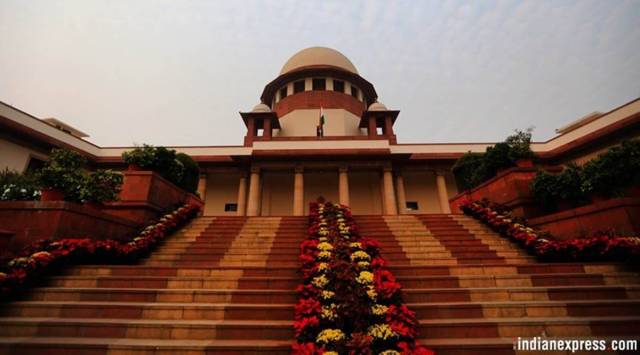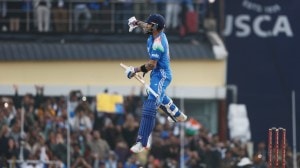‘Mere membership of unlawful outfit is UAPA offence’: SC reverses past orders
The Centre and Assam had appealed against the ruling in the Arup Bhuyan case, following which a two-judge bench referred the matter to a larger bench in 2014.
 The court was examining three of its judgments delivered in 2011 — State of Kerala vs Raneef; Arup Bhuyan vs Union of India; and Indra Das vs State of Assam.
The court was examining three of its judgments delivered in 2011 — State of Kerala vs Raneef; Arup Bhuyan vs Union of India; and Indra Das vs State of Assam. THE SUPREME Court on Friday reversed its earlier ruling which said that “mere membership of a banned organisation will not incriminate a person” under the Unlawful Activities (Prevention) Act, 1967, and Terrorist and Disruptive Activities (Prevention) Act, 1987, “unless he resorts to violence or incites people to violence and does an act intended to create disorder or disturbance of public peace by resort to violence”.
A three-judge bench of Justices M R Shah, C T Ravikumar and Sanjay Carol held that the court’s three decisions in 2011 which took this view were “not a good law”.
“When an association is declared unlawful by notification issued under Section 3 (of UAPA)… a person who is and continues to be a member of such association is liable to be punished with imprisonment for a term which may extend to two years, and shall also be liable to fine under Section 10(a)(i) of the UAPA, 1967,” the court said.
“As per Section 10(a)(i), a person cannot be punished merely because he was the member of such unlawful association… The language of Section 10(a)(i) is also very cautiously worded, ‘who is and continues to be a member of such association’. Therefore, on true interpretation, if a person has been a member but does not continue to be a member after declaration, that does not attract mischief of Section 10,” it said.
The court was examining three of its judgments delivered in 2011 — State of Kerala vs Raneef; Arup Bhuyan vs Union of India; and Indra Das vs State of Assam. On February 3, 2011, the court had acquitted suspected ULFA member Arup Bhuyan, who was held guilty by a TADA court on the basis of his alleged confessional statement, and said mere membership of a banned organisation will not make a person a criminal. Similar views were taken by the court in the two other verdicts.
The Centre and Assam had appealed against the ruling in the Arup Bhuyan case, following which a two-judge bench referred the matter to a larger bench in 2014.
Ruling on the reference, the SC said that in the Raneef case, only a bail application was before the court, and the constitutional validity of Section 10, more particularly Section 10(a)(i), of the UAPA, was not under challenge. The Union of India was not a party and was not even heard, it said.
In the Arup Bhuyan and Indra Das cases, the court only followed what was said in the Raneef case, the bench said. Even in the Arup Bhuyan case, the constitutional validity of the relevant provisions of TADA was not under challenge, nor was the Centre heard. “In both the… decisions (Raneef and Arup Bhuyan) this Court had not taken into consideration Article 19(1)(c) and Article 19(4) of the Constitution of India,” the Bench noted.
The ruling referred to the reading down of Section 10(a)(i) of the UAPA, 1967, in the Arup Bhuyan case. “When any provision of Parliamentary legislation is read down in the absence of Union of India, it is likely to cause enormous harm to the interest of the State. If the opportunity would have been given to the Union of India to put forward its case…the Union of India would have made submissions in favour of Section 10(a)(i) of the UAPA, including the object and purpose for enactment of such a provision and even the object and purpose of UAPA,” it said.
“Reading down the provision of a statute cannot be resorted to when the meaning of a provision is plain and unambiguous and the legislative intent is clear,” it said.
The Bench also disagreed with the SC relying on certain decisions of the US Supreme Court, and pointed out that there are differences in the laws of the two countries. Unlike the US, right to freedom of speech in India is not an absolute right and is subject to reasonable restrictions, and the Constitution permits Parliament to frame the laws taking into consideration the public order and/ or the sovereignty of India, it said.
The court, in deciding the two cases, “without noticing the differences in American and Indian laws… has erred in straightway and directly following the US Supreme Court decisions, and that too without adverting to the differences and the position of laws in India,” it said.
In a separate concurring judgment, Justice Sanjay Karol said: “The American decisions primarily involve indictment on the basis of membership of political organisations or incidents of free speech advocating overthrow of the government. However, under Indian law, it is not membership of political organisations etc. or free speech or criticism of the government that is sought to be banned, it is only those organisations which aim to compromise the sovereignty and integrity of India and have been notified to be such and unlawful, whose membership is prohibited. This is in furtherance of the objective of the UAPA, which has been enacted to provide for the more effective prevention of certain unlawful activities of individuals and associations and dealing with terrorist activities and for matters connected therewith. The distinction, therefore, is clear”.







